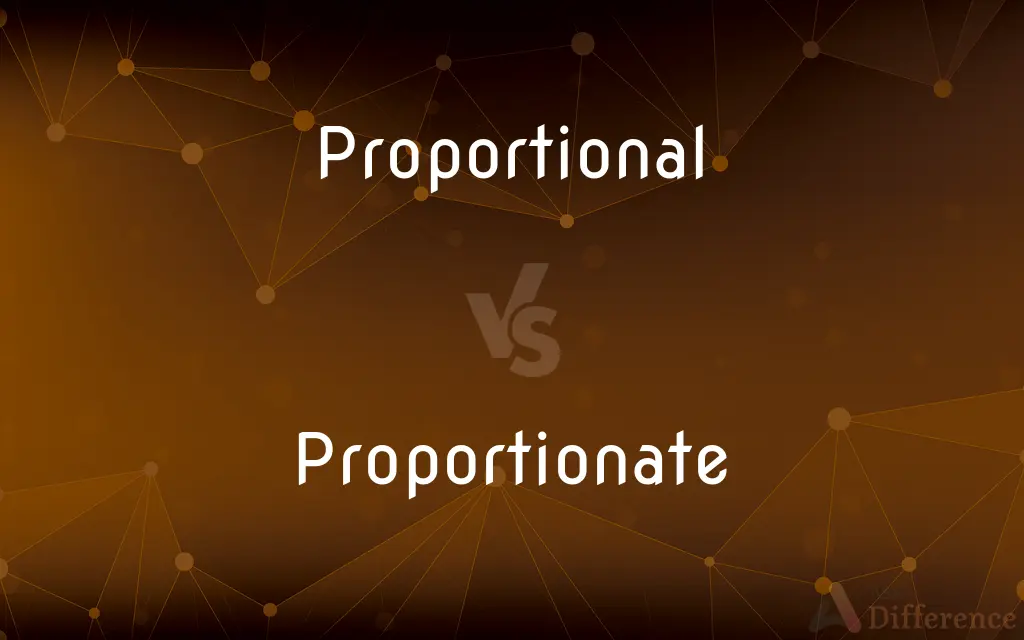Proportional vs. Proportionate — What's the Difference?
By Tayyaba Rehman & Urooj Arif — Updated on March 27, 2024
Proportional relates to a consistent ratio, while proportionate means being in proper proportion.

Difference Between Proportional and Proportionate
Table of Contents
ADVERTISEMENT
Key Differences
While proportional relationships are concerned with the mathematical or mechanical aspects of how quantities relate to each other, proportionate judgments often involve subjective assessments of what is considered appropriate or balanced in a given situation.
In designing a building, the architect might seek proportional dimensions to ensure structural integrity and aesthetic appeal, whereas ensuring that the materials used are proportionate to the building’s intended use and occupancy involves considering factors like durability, cost, and safety.
The distinction also extends to usage in everyday language. Proportional might be used to describe the way parts of a machine move in relation to each other, while proportionate might be used more broadly to discuss fairness in the distribution of resources or penalties.
The concept of being proportional can apply across various fields and contexts, indicating a wide applicability of the principle of maintaining a constant ratio. In contrast, being proportionate often involves a more nuanced consideration of what amounts or sizes are deemed suitable or fair according to specific criteria or norms.
Comparison Chart
Definition
Relating to a consistent ratio between quantities.
Being in proper proportion or balance.
ADVERTISEMENT
Context
Mathematics, science, engineering.
Judgments of appropriateness, fairness.
Focus
Mathematical or mechanical relationships.
Subjective assessments of balance and suitability.
Examples
Proportional response in physics.
Proportionate punishment in law.
Usage
Describes relationships that maintain consistency.
Emphasizes fairness or appropriateness of size/amount.
Compare with Definitions
Proportional
Corresponding in size or amount to something else.
The ingredients were added in proportional quantities.
Proportionate
Reflecting a sense of fairness.
The judge aimed for proportionate sentences for similar crimes.
Proportional
Reflecting a relationship of comparative magnitude.
The response was proportional to the input force.
Proportionate
Corresponding in size or importance.
The penalties were proportionate to the offenses.
Proportional
Having parts in harmony with each other.
The sculpture’s dimensions were perfectly proportional.
Proportionate
Being in balanced proportion.
The design featured proportionate elements that enhanced its beauty.
Proportional
Relating to or having a constant ratio.
The gears are designed to move in a proportional manner.
Proportionate
Adjusted according to a scale or standard.
The distribution of resources was made in a proportionate manner.
Proportional
Mathematics principle of constant relation.
The sides of similar triangles are proportional.
Proportionate
Suitably sized or scaled.
The furniture was proportionate to the room's size, making it feel spacious.
Proportional
Forming a relationship with other parts or quantities; being in proportion.
Proportionate
Being in due proportion; proportional.
Proportional
Properly related in size, degree, or other measurable characteristics; corresponding
Punishment ought to be proportional to the crime.
Proportionate
To make proportionate.
Proportional
(Mathematics) Having the same or a constant ratio.
Proportionate
In proportion; proportional; commensurable.
Proportional
One of the quantities in a mathematical proportion.
Proportionate
Harmonious and symmetrical.
Proportional
(mathematics) At a constant ratio (to). Two magnitudes (numbers) are said to be proportional if the second varies in a direct relation arithmetically to the first. Symbol: ∝.
Proportionate
(transitive) To make proportionate.
Proportional
In proportion (to), proportionate.
Proportionate
Adjusted to something else according to a proportion; proportional.
What is proportionate to his transgression.
Proportional
Of a typeface, having characters with natural (non-uniform) width (in contrast to monospace typefaces).
Proportionate
To make proportional; to adjust according to a settled rate, or to due comparative relation; to proportion; as, to proportionate punishment to crimes.
Proportional
A proportion.
Proportionate
Being in due proportion
Proportional
Having a due proportion, or comparative relation; being in suitable proportion or degree; as, the parts of an edifice are proportional.
Proportionate
Agreeing in amount, magnitude, or degree;
The figures are large but the corresponding totals next year will be larger
Proportional
Relating to, or securing, proportion.
Proportionate
Exhibiting equivalence or correspondence among constituents of an entity or between different entities
Proportional
Constituting a proportion; having the same, or a constant, ratio; as, proportional quantities; momentum is proportional to quantity of matter.
Proportional
Any number or quantity in a proportion; as, a mean proportional.
Proportional
The combining weight or equivalent of an element.
Proportional
One of the quantities in a mathematical proportion
Proportional
Properly related in size or degree or other measurable characteristics; usually followed by `to';
Punishment oughtt to be proportional to the crime
Earnings relative to production
Proportional
Increasing as the amount taxed increases
Common Curiosities
How do I determine if something is proportional or proportionate?
Determine if the context involves a mathematical ratio or a judgment of appropriateness. The former suggests proportional, while the latter indicates proportionate.
Are proportional and proportionate interchangeable?
While related, they are not fully interchangeable as they emphasize different aspects: mathematical consistency vs. appropriateness and balance.
What does proportional mean?
Proportional refers to a relationship where one quantity is a constant fraction of another, indicating a consistent ratio.
Can something be proportional but not proportionate?
Yes, something can be proportional (maintain a consistent ratio) without being proportionate (not necessarily appropriate or balanced for the situation).
Can the concept of being proportionate apply to abstract concepts?
Yes, proportionate can apply to abstract concepts like justice, where penalties are considered in relation to the severity of actions.
Can design elements be both proportional and proportionate?
Yes, design elements can be both proportional (in consistent ratio to each other) and proportionate (appropriate and balanced within the overall design).
What is meant by proportionate?
Proportionate means being in proper or appropriate proportion, suggesting a balance in size, amount, or degree.
How is proportionate used in legal contexts?
In legal contexts, proportionate is used to describe penalties or judgments that are considered fair and balanced relative to the offenses.
Is proportional used more in technical fields?
Yes, proportional is often used in mathematics, science, and engineering to describe consistent quantitative relationships.
What role does proportionality play in ethics?
In ethics, proportionality can guide decisions to ensure that actions are appropriate to the circumstances and consequences are just.
How do I make a design proportionate?
Making a design proportionate involves ensuring that its elements are suitably sized and balanced relative to each other and the whole.
What is a proportional response?
A proportional response is one that matches the scale or severity of an action or stimulus in a consistent and rational manner.
How do cultures influence the perception of what is proportionate?
Cultural norms and values can significantly influence what is considered proportionate or appropriate in size, punishment, or distribution.
Does proportionate imply a value judgment?
Yes, calling something proportionate often involves a value judgment regarding its appropriateness or fairness.
Can environmental policies be both proportional and proportionate?
Environmental policies can aim to be both proportional in their approach to sustainability and proportionate in the burdens they place on different sectors.
Share Your Discovery

Previous Comparison
Excited vs. Exited
Next Comparison
Listening vs. SpeakingAuthor Spotlight
Written by
Tayyaba RehmanTayyaba Rehman is a distinguished writer, currently serving as a primary contributor to askdifference.com. As a researcher in semantics and etymology, Tayyaba's passion for the complexity of languages and their distinctions has found a perfect home on the platform. Tayyaba delves into the intricacies of language, distinguishing between commonly confused words and phrases, thereby providing clarity for readers worldwide.
Co-written by
Urooj ArifUrooj is a skilled content writer at Ask Difference, known for her exceptional ability to simplify complex topics into engaging and informative content. With a passion for research and a flair for clear, concise writing, she consistently delivers articles that resonate with our diverse audience.














































